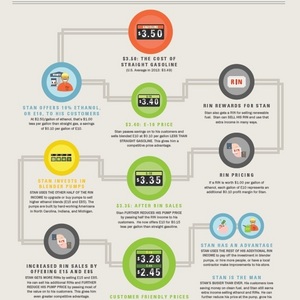ACE says blend wall "cost" reports are incomplete and misleading

American Coalition for Ethanol
April 7, 2014
BY American Coalition for Ethanol
Ron Lamberty, senior vice president for the American Coalition for Ethanol has called media reports that the “blend wall” cost refiners approximately $1.35 billion last year “incomplete and misleading.” A recent Reuters article said that was the amount nine companies paid for renewable identification number (RINs), which are credits refiners provide to EPA to prove they bought the amount of renewable fuels required by law. RINs are free to refiners who blend biofuels, while refiners who choose not to blend biofuels can buy RINs from companies that blend more than the law requires.
“Those refiners made a business decision to purchase credits instead of ethanol. Reports aren’t honest if they fail to point out that those nine refiners paid $1.35 billion dollars to other refiners for those companies’ excess RINs.” said Lamberty. “The “blend wall” provided $1.35 billion dollars of income to some refiners, which reduced their cost of fuel.”
Lamberty said ACE would like to see more RINs generated by retailers, since they generally use the additional funds to reduce prices at the pumps. “Unfortunately, at the same time oil companies are complaining about RINs and the “blend wall,” they enforce policies that won’t allow their branded marketers to sell E15 and higher ethanol blends,” Lamberty said. “Station owners who offer E15, E85, and other blends generally sell about 20 percent ethanol overall, making more RINs available. And when they sell RINs, they pass most of the value of those RINs on to customers in the form of lower pump prices.”
ACE has created an infographic that shows how RINs can help independent retailers and petroleum companies increase profits, pay for new equipment, and pass on fuel savings for consumers. That infographic on RINs can be viewed here.
Advertisement
Advertisement
Related Stories
The U.S. EPA on July 8 hosted virtual public hearing to gather input on the agency’s recently released proposed rule to set 2026 and 2027 RFS RVOs. Members of the biofuel industry were among those to offer testimony during the event.
The USDA’s Risk Management Agency is implementing multiple changes to the Camelina pilot insurance program for the 2026 and succeeding crop years. The changes will expand coverage options and provide greater flexibility for producers.
President Trump on July 4 signed the “One Big Beautiful Bill Act.” The legislation extends and updates the 45Z credit and revives a tax credit benefiting small biodiesel producers but repeals several other bioenergy-related tax incentives.
CARB on June 27 announced amendments to the state’s LCFS regulations will take effect beginning on July 1. The amended regulations were approved by the agency in November 2024, but implementation was delayed due to regulatory clarity issues.
SAF Magazine and the Commercial Aviation Alternative Fuels Initiative announced the preliminary agenda for the North American SAF Conference and Expo, being held Sept. 22-24 at the Minneapolis Convention Center in Minneapolis, Minnesota.
Upcoming Events










